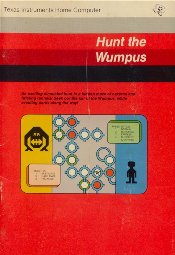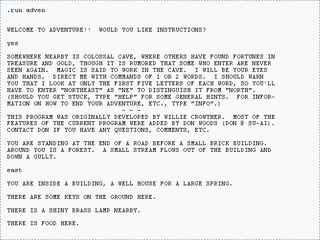Related Research Articles

Hunt the Wumpus is a text-based adventure game developed by Gregory Yob in 1973. In the game, the player moves through a series of connected caves, arranged as the vertices of a dodecahedron, as they hunt a monster named the Wumpus. The turn-based game has the player trying to avoid fatal bottomless pits and "super bats" that will move them around the cave system; the goal is to fire one of their "crooked arrows" through the caves to kill the Wumpus. Yob created the game in early 1973 due to his annoyance at the multiple hide-and-seek games set in caves in a grid pattern, and multiple variations of the game were sold via mail order by Yob and the People's Computer Company. The source code to the game was published in Creative Computing in 1975 and republished in The Best of Creative Computing the following year.
Interactive fiction (IF) is software simulating environments in which players use text commands to control characters and influence the environment. Works in this form can be understood as literary narratives, either in the form of Interactive narratives or Interactive narrations. These works can also be understood as a form of video game, either in the form of an adventure game or role-playing game. In common usage, the term refers to text adventures, a type of adventure game where the entire interface can be "text-only", however, graphical text adventure games, where the text is accompanied by graphics still fall under the text adventure category if the main way to interact with the game is by typing text. Some users of the term distinguish between interactive fiction, known as "Puzzle-free", that focuses on narrative, and "text adventures" that focus on puzzles.

White Wolf Entertainment AB, formerly White Wolf Publishing, was an American roleplaying game and book publisher. The company was founded in 1991 as a merger between Lion Rampant and White Wolf Magazine, and was initially led by Mark Rein-Hagen of the former and Steve Wieck and Stewart Wieck of the latter. White Wolf Publishing, Inc. merged with CCP Games in 2006. White Wolf Publishing operated as an imprint of CCP hf, but ceased in-house production of any material, instead licensing their properties to other publishers. It was announced in October 2015 that White Wolf had been acquired from CCP by Paradox Interactive. In November 2018, after most of its staff were dismissed for making controversial statements, it was announced that White Wolf would no longer function as an entity separate from Paradox Interactive.

Zork is a text adventure game first released in 1977 by developers Tim Anderson, Marc Blank, Bruce Daniels, and Dave Lebling for the PDP-10 mainframe computer. The original developers and others, as the company Infocom, expanded and split the game into three titles—Zork I: The Great Underground Empire, Zork II: The Wizard of Frobozz, and Zork III: The Dungeon Master—which were released commercially for a range of personal computers beginning in 1980. In Zork, the player explores the abandoned Great Underground Empire in search of treasure. The player moves between the game's hundreds of locations and interacts with objects by typing commands in natural language that the game interprets. The program acts as a narrator, describing the player's location and the results of the player's commands. It has been described as the most famous piece of interactive fiction.
Inform is a programming language and design system for interactive fiction originally created in 1993 by Graham Nelson. Inform can generate programs designed for the Z-code or Glulx virtual machines. Versions 1 through 5 were released between 1993 and 1996. Around 1996, Nelson rewrote Inform from first principles to create version 6. Over the following decade, version 6 became reasonably stable and a popular language for writing interactive fiction. In 2006, Nelson released Inform 7, a completely new language based on principles of natural language and a new set of tools based around a book-publishing metaphor.

Colossal Cave Adventure is a text-based adventure game, released in 1976 by developer Will Crowther for the PDP-10 mainframe computer. It was expanded upon in 1977 by Don Woods. In the game, the player explores a cave system rumored to be filled with treasure and gold. The game is composed of dozens of locations, and the player moves between these locations and interacts with objects in them by typing one- or two-word commands which are interpreted by the game's natural language input system. The program acts as a narrator, describing the player's location and the results of the player's attempted actions. It is the first well-known example of interactive fiction, as well as the first well-known adventure game, for which it was also the namesake.
World of Darkness is a series of tabletop role-playing games, originally created by Mark Rein-Hagen for White Wolf Publishing. It began as an annual line of five games in 1991–1995, with Vampire: The Masquerade, Werewolf: The Apocalypse, Mage: The Ascension, Wraith: The Oblivion, and Changeling: The Dreaming, along with off-shoots based on these. The series ended in 2004, and the reboot Chronicles of Darkness was launched the same year with a new line of games. In 2011, the original series was brought back, and the two have since been published concurrently.

Hunter: The Reckoning is a horror tabletop role-playing game, and the sixth main game in the World of Darkness series. It was originally released by White Wolf Publishing in November 1999 as part of their Year of the Reckoning line. A second edition, based on the Vampire: The Masquerade 5th edition ruleset, was released in 2022 by Renegade Game Studios. It is supported by a series of supplementary books which expand the game's setting and describe types of characters.

Andrew Plotkin, also known as Zarf, is a central figure in the modern interactive fiction (IF) community. Having both written a number of award-winning games and developed a range of new file formats, interpreters, and other utilities for the design, production, and running of IF games, Plotkin is widely recognised for both his creative and his technical contributions to the homebrew IF scene.
The XYZZY Awards are the annual awards given to works of interactive fiction, serving a similar role to the Academy Awards for film. The awards were inaugurated in 1997 by Eileen Mullin, the editor of XYZZYnews. Any game released during the year prior to the award ceremony is eligible for nomination to receive an award. The decision process takes place in two stages: members of the interactive fiction community nominate works within specific categories and sufficiently supported nominations become finalists within those categories. Community members then vote among the finalists, and the game receiving a plurality of votes is given the award in an online ceremony.
Trade Wars is a series of video games dating back to 1984. The video games are inspired by Hunt the Wumpus, the board game Risk, and the original space trader game Star Trader.

Mind's Eye Theatre is a live action role-playing game (LARP) based on the White Wolf World of Darkness universe and shares the setting with the tabletop role-playing game Vampire: The Masquerade, among others.
Spider and Web is a piece of interactive fiction written by Andrew Plotkin.

Thief: The Dark Project is a 1998 first-person stealth video game developed by Looking Glass Studios and published by Eidos Interactive. Set in a fantasy metropolis called the City, players take on the role of Garrett, a master thief trained by a secret society who, while carrying out a series of robberies, becomes embroiled in a complex plot that ultimately sees him attempting to prevent a great power from unleashing chaos on the world.
The Space Under the Window is a 1997 interactive fiction game by Andrew Plotkin. The game is part of a collaborative art piece, also entitled "The Space Under the Window", by Kristin Looney – each piece had to have this title, but was otherwise unconstrained.
Jon Ingold is a British author of interactive fiction and co-founder of inkle, where he co-directed and co-wrote 80 Days, and wrote Heaven's Vault and Overboard!. His interactive fiction has frequently been nominated for XYZZY Awards and has won on multiple occasions, including Best Game, Best Story and Best Setting awards for All Roads in 2001. Ingold's works are notable for their attention to the levels of knowledge that the player and player character have of the in-game situation, with the effect often depending on a player who understands more than the character or vice versa. Ingold has also written a number of plays, short stories and novels.
Shade is a psychological horror interactive fiction game written and published by Andrew Plotkin in 2000.

Dungeons & Dragons Computer Fantasy Game is a handheld electronic game released by Mattel in 1981. Designer Peter Oliphant claims that it was one of the more basic projects he worked on during his career.
An adventure game is a video game genre in which the player assumes the role of a protagonist in an interactive story, driven by exploration and/or puzzle-solving. The genre's focus on story allows it to draw heavily from other narrative-based media, such as literature and film, encompassing a wide variety of genres. Most adventure games are designed for a single player, since the emphasis on story and character makes multiplayer design difficult. Colossal Cave Adventure is identified by Rick Adams as the first such adventure game, first released in 1976, while other notable adventure game series include Zork, King's Quest, Monkey Island, Syberia, and Myst.

Vampire: The Masquerade is a line of interactive fiction video games based on the tabletop game of the same name, and is part of the World of Darkness series. They are developed by Choice of Games for Android, iOS, Linux, MacOS, Microsoft Windows, and web browsers, and include Night Road (2020) by Kyle Marquis, Out for Blood (2021) by Jim Dattilo, Parliament of Knives (2021) by Jeffrey Dean, and the Sins of the Sires (2022) by Natalia Theodoridou.
References
- Muckenhoupt, Carl and Duncan Stevens (2000). "Hunter, in Darkness". Baf's Guide to the Interactive Fiction Archive. Retrieved February 20, 2006.
- Stevens, Duncan (2000). "Hunter, in Darkness". SPAG: Society for the Promotion of Adventure Games. Retrieved August 12, 2008.